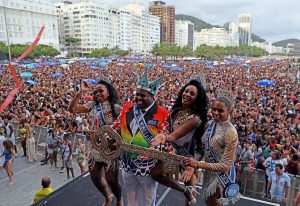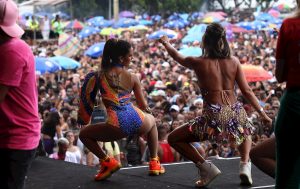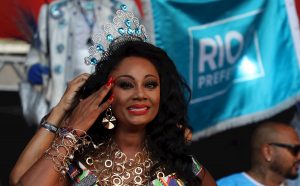By Janaona Quinet

Rio de Janeiro, Jan 12 (efe-epa).- Carnival in Rio de Janeiro, the world’s biggest such celebration, began Sunday with the first street dance troups and the election of King Momo, an emblematic figure that, for the first time, received the keys to the city a month before the official start of the festivities.
The “blocos” – dance groups enlivened by musical bands – on Sunday gave the initial flavor to Rio’s Carnival, with about half a million people taking to the streets to dance to the rhythms of the “Baile de Favorita.”
That massive dance launched the so-called “50 days of Carnival” and immersed the coastal metropolis in “Rio funk,” a musical genre born in the huge “favelas,” or shantytowns, that sprawl across the urban landscape with uninhibited lyrics that are at times controversial for their sexual content and a beat similar to reggaeton.

Assorted singers and performers headlined the show on a raised stage on Copacabana Beach, one of Rio’s most-visited and iconic tourist spots, where just two weeks ago thousands of people gathered to welcome the New Year.
Amid a huge security contingent, Brazilians endured the high temperatures of the Southern Hemisphere’s summer to unofficially kick off the Carnival activities a little more than a month before the traditional extravagant, colorful and exciting performances of the samba schools.
The samba, the most emblematic rhythm of this huge celebration, was also everywhere on the weekend, especially during the contest at which King Momo and his queen were crowned and who, on Sunday and very much to the surprise of the public, were handed the keys to the city.
Traditionally, the symbolic presentation of the city keys takes place on the Friday of Carnival week, but this year the ceremony was moved up by more than a month and was held on the day of King Momo’s election, that character habitually being a black, good-natured, hefty, kind figure who – above all – is a good dancer.

Wearing stunning costumes and suites of feathers, four men and six women on Sunday displayed their best dance moves for the thousands of people gathered with an eye toward being selected King Momo and his queen, and that honor ultimately fell to dancers DJferson Mendes da Silva, 32, and Camila Aparecida da Silva, 33.
On the coming weekends, a growing number of dance troups will take to the streets in Rio and once Carnival officially begins in February the city will enjoy five days of continuous revelry and the “blocos” will perform at hundreds of daily parties, all for free.
In recent years, the number of dance troups has multiplied all across Brazil and, in addition to Rio, Salvador and Recife – the historic centers of the Carnival celebration – now cities like Sao Paulo have tossed away their suits and ties and have joined in with the joyful, if rather frenzied, celebration.
On the Sunday and Monday of Carnival week is when the samba schools will stage their spectacular dance parades for more than 70,000 people holding prepaid tickets costing hundreds of dollars at the city’s “sambodrome.”
Ultimately, by March 1, when the 50 days of Carnival conclude, authorities expect 1.9 million tourists to have visited Rio, setting a new attendance and participation record.
